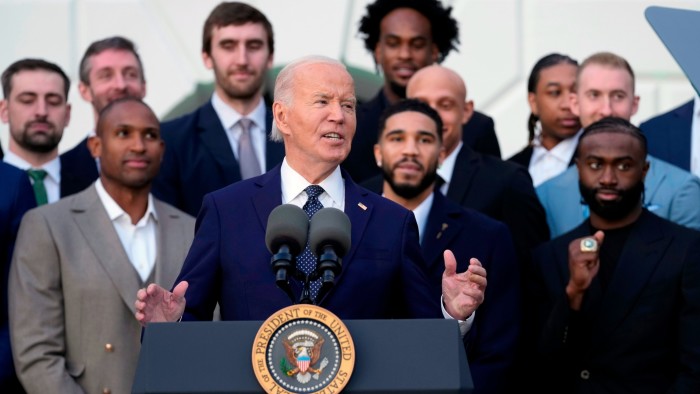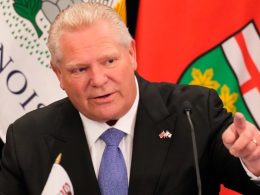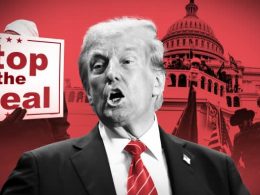Joe Biden is staging a final push to deliver more aid to Ukraine, lock in manufacturing subsidies and confirm federal judges as he tries to secure his legacy before Donald Trump starts his second term in January.
Following vice-president Kamala Harris’s defeat to Trump this month, and the failure of his own re-election bid in July, Biden has been urging his cabinet and senior officials to ramp up, rather than wind down, their activities.
For many administration officials, the push to double down on domestic and foreign policy initiatives is an attempt to preserve some of their biggest accomplishments and head off Trump’s attempts to reverse them.
“The president has been very clear that we need to get as much done as possible, and he wants it to be as productive a period as other periods in his presidency,” a White House official said on Friday.
On the global stage, Biden is still grappling with the Russia-Ukraine conflict and Israel’s wars with Hamas in Gaza and Hizbollah in Lebanon, both of which have weighed heavily on his presidency.
In a flurry of last-minute decisions, Biden and his team have taken steps to help Kyiv strengthen its position on the battlefield, ultimately improving its leverage in negotiations with Russia over a settlement that might now come sooner rather then later.
Trump, a sceptic of Ukraine aid, has pledged to end the war between Russia and Ukraine quickly, and vice president-elect JD Vance outlined a plan on the campaign trail in which Russia would hold on to the territory it has taken.
But the Biden administration is still trying to give one last jolt of help to Ukraine, including a surge of $7bn in lethal aid and significant policy shifts regarding the use of US-provided weapons.
Notably, the US has approved Kyiv’s use of long-range weapons for deep strikes into Russian territory and will transfer anti-personnel mines to Ukraine.
In the Middle East, Biden has failed to achieve his goal of securing a ceasefire deal between Israel and Gaza that could lead to the release of the remaining hostages held by Hamas — and there is scant hope that could be reached within the next two months.
But Biden has set his sights on halting the fighting between Israel and Hizbollah, dispatching Amos Hochstein, a senior aide, to the region, though it is also a long-shot. The aim is to allow tens of thousands of displaced Israelis to return to their homes on the Israel-Lebanon border and for Hizbollah to move its forces away from the contested area.
At home, the strong jobs growth under Biden’s watch fell flat with voters, who punished Harris over his administration’s record on inflation even though price gains have eased since their peak in 2022.
Biden’s main goal now is to make sure that the hundreds of billions of dollars in investments he enacted to spur domestic manufacturing and infrastructure upgrades — from chip production to clean energy plants — can live on in the second Trump era.
“We’re really mobilising on . . . getting projects online, getting funding out the door, making sure that we execute as much as we can on the different legislation that the president passed,” the White House official said.
Gina Raimondo, Biden’s commerce secretary, has said she aims to spend “almost all” of the $50bn earmarked to supercharge US chip manufacturing under Biden’s Chips Act, of which $39bn is directed to incentives and $11bn is for research and development.
In a recent interview with Politico, Raimondo said she directed her staff to work through the weekend and made personal calls to tech company executives to try and speed up deals.
“The chips team has announced preliminary agreements with two dozen companies for chips awards, and over the next two months, plans to announce preliminary agreements for all $39bn of that funding, and is well on its way towards securing final agreements for many of those entities [where] preliminary awards were announced,” another White House official said.
Meanwhile, Biden’s top climate officials have sought to reassure allies that Donald Trump will not be able to halt the progress of Biden’s flagship Inflation Reduction Act, which contains $369bn in subsidies for clean technologies.
John Podesta, Biden’s top climate adviser, told delegates at this month’s UN climate summit that he believed Republicans would not try to reverse the IRA because the subsidies helped companies set up factories in red states.
“Many Republicans, especially governors, know all this activity is a good thing for their districts, states and for their economies,” said Podesta.
But the other big domestic priority for Biden is to press the Senate — which will be controlled by Democrats until early January — to confirm as many of his judicial appointments as possible before Trump is able to usher in a new wave of conservative nominees to federal courts.
During his first presidency, Trump installed more than 200 federal judges, including staffing nearly as many influential appellate court judges in one term as former president Barack Obama did in two, according to Pew Research.
Trump appointed 54 appellate judges, one shy of Obama’s total. Trump also cemented the highest court’s conservative supermajority by appointing three justices in his first term.
Biden has already appointed more than 200 federal judges but only one justice to the Supreme Court — the liberal Ketanji Brown Jackson. That did not affect the court’s ideological leaning.
Now, the president wants to see Chuck Schumer, the Democratic senate majority leader, quickly approve as many Biden appointees as possible.
“We’ve been working with them very, very closely to get as many of the president’s nominees confirmed because he believes that he wants to leave a lasting impact on the judiciary,” the White House official said.
Source link









